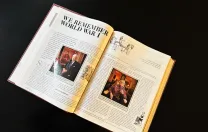I entered Harvard in the fall of 1917 to find that classes were melting away daily in the heat of the conflagration overseas. Talk of war and the implications of war on the lives of freshman students as well as of upperclassmen filled the air to the exclusion of practically everything else. The ranks of the seniors, juniors, and sophomores were already depleted by the ravages of conscription; so great was the drain that for the first time in history, not enough candidates were available for the varsity football frolic with Yale (the game had to be canceled and a match between freshman teams substituted). Young men not yet old enough for war simply couldn’t sit idly by while others were called to the colors; they kept casting about for ways to help further—eventually, if not now—the country’s growing military might. Who could concentrate on prosaic subjects like English grammar, economics, or ancient history when the world was afire and history in the making was screaming from the headlines every day?
—Henry S. Villard ’21, Red Cross Driver in Italy (unpublished memoir, 1982)
Harvard’s attitude toward pacifism and unpatriotic propaganda is unmistakable…. Freedom of speech and thought, differences of opinion on all questions, are to be desired. But there is a limit to all things. A handful of misguided senators blocked the passage of military measures at Washington and brought upon themselves the opprobrium of the nation; a handful of misguided undergraduates of the University are screaming for neutrality even now. Some of them are sincere, but blind, in their beliefs; others are simply cowards.
The time has now come when such nonsense should stop…. Hereafter, the Crimson will print no more communications of a pacifistic nature. If there are any members of the University so blind or cowardly in spirit as to clamor for neutrality when all hope of neutrality is dead, they should commune with themselves in private and find reflection in the definition of traitors as those “…adhering to their enemies, giving them aid and comfort.”
—“Silentia Vobiscum,” editorial in the Harvard Crimson (April 4, 1917)
In the great attack on 15 June, the bombardment and excitement was so great that I found I could do anything—even to pulling dead mules out of the road…. We dodged shell holes and whizzing shells with sixteen wounded inside the ambulance, all yelling at the top of their lungs with fear of being taken prisoner. Then came the marvels of the wounded’s wonderful courage—which prevented me from having feelings except for marveling their bravery…. Have I lost my sympathetic senses that I can carry bloody men and watch operations without feelings?
It is as I thought, Death is a very different matter when you are under fire. You don’t think of it at all, or if you do it is only to say to yourself, “I’m got if I’m got.” Death will come only to us from shells, and shells cannot be avoided. Those you hear have passed and exploded before you hear them…. [I]f we have to make a trip we take our chances.
—the late Charles W. Eliot 2d ’20, M.L.A. ’23, letter to his family (June 26, 1918)
When we first heard of the Armistice we felt a sense of relief too deep to express, and we all got drunk. We had come through, we were still alive, and nobody at all would be killed tomorrow. The composite fatherland for which we had fought and in which some of us still believed—France, Italy, the Allies, our English homeland, democracy, the self-determination of small nations—had triumphed. We danced in the streets, embraced old women and pretty girls, swore blood brotherhood with soldiers in little bars, drank with our elbows locked in theirs, reeled through the streets with bottles of champagne, fell asleep somewhere. On the next day, after we got over our hangovers, we didn’t know what to do, so we got drunk. But slowly, as the days went by, the intoxication passed, and the tears of joy: it appeared that our composite fatherland was dissolving into quarreling statesmen and oil and steel magnates. Our own nation had passed the Prohibition Amendment as if to publish a bill of separation between itself and ourselves; it wasn’t our country any longer. Nevertheless we returned to it: there was nowhere else to go. We returned to New York, appropriately—to the homeland of the uprooted, where everyone you met came from another town and tried to forget it; where nobody seemed to have parents, or a past more distant than last night’s swell party, or a future beyond the swell party this evening and the disillusioned book we would write tomorrow.
—Malcolm Cowley ’19, Exile’s Return (1934)
To us, the European War of 1914-1918 seemed a horrible monstrosity, something outside of the normal order of things, like an epidemic of yellow fever in some place where yellow fever had never been heard of before…. War and oppression in the early years of this century appeared to us like stinking slums in a city that was otherwise beautiful and good to live in, blemishes that skill and courage would remove. To the young men of today these things are the inherent deformities of mankind.
—John Dos Passos ’16, preface to One Man’s Initiation, 1917 (1945 edition)
I have a rendezvous with Death
At some disputed barricade,
When Spring comes back with rustling shade
And apple-blossoms fill the air—
I have a rendezvous with Death
When Spring brings back blue days and fair.
—Alan Seeger ’10, Poems (1916)









